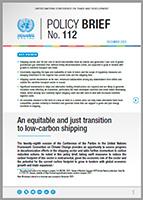An equitable and just transition to low-carbon shipping

UNCTAD Policy Brief No. 112
The twenty-eighth session of the Conference of the Parties to the United Nations Framework Convention on Climate Change provides an opportunity to assess progress in decarbonization efforts in the shipping sector and adds further momentum to carbon reduction actions.
As noted in this policy brief, taking swift measures to reduce the carbon footprint of this sector is instrumental, given the economic role of the sector and the potential for the current carbon footprint to grow in tandem with global economic growth and trade expansion.
Key Points:
- Shipping carries over 80 per cent of world merchandise trade by volume and generates 3 per cent of global greenhouse gas emissions that, without timely decarbonization action, are expected to grow in tandem with growth in maritime transport and trade.
- Uncertainty regarding the type and availability of fuels in future and the scope of regulatory measures are delaying investment in the required low-carbon fuels and the shipping fleet.
- Shipping cannot decarbonize on its own; enhanced collaboration among key stakeholders from within and outside the maritime transport sector is crucial.
- Significant investments in ships and alternative fuelling infrastructure are required and are likely to generate transition costs affecting all economies, particularly the least developed countries and small island developing States, which already face relatively higher shipping costs and will need to deal with increased maritime logistics costs.
- An economic measure in the form of a levy on fuels or a carbon price can help make alternative fuels more competitive, provide certainty to investors and generate funds that can support a green and just energy transition in shipping.
This policy brief builds on the findings in of the UNCTAD Review of Maritime Transport 2023 - Chapter 3: Decarbonizing shipping


